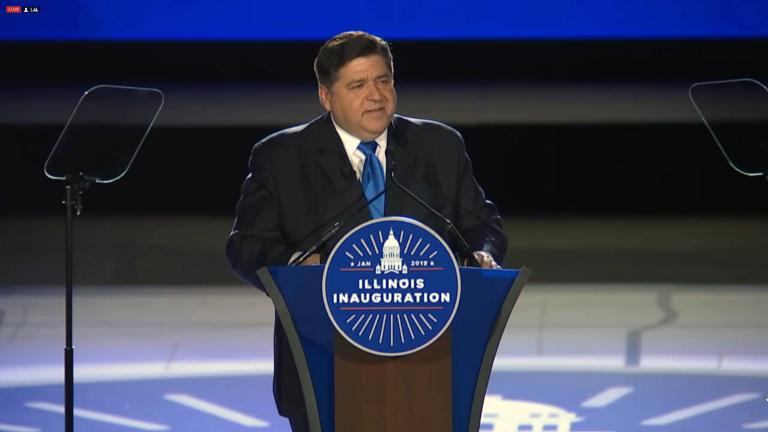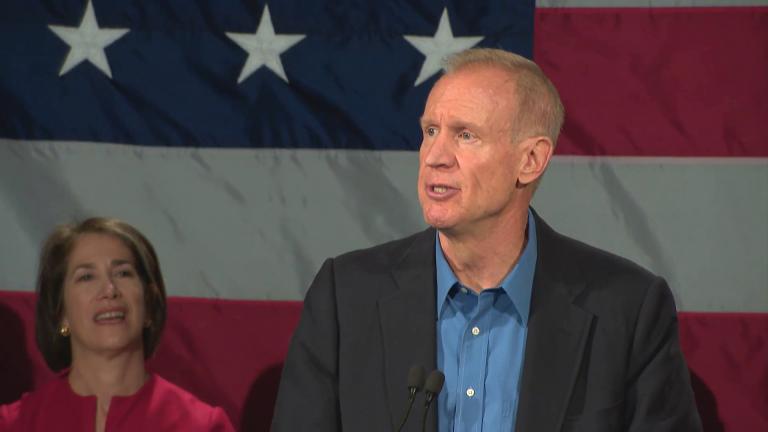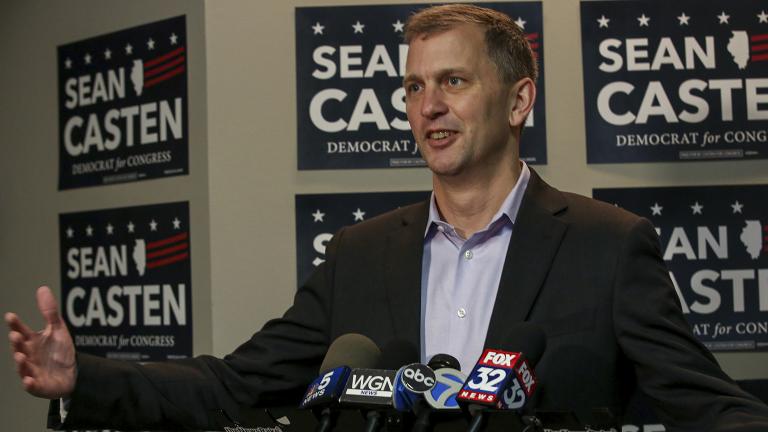Video: Debra Shore tells voters about her platform. Learn more about Candidate Free Time.
About this candidate
Name: Debra Shore
DOB: 08/03/1952
Residence: Evanston
Family: Kathleen Gillespie, spouse; Ben Smith, adult son
Occupation: Commissioner, Metropolitan Water Reclamation District of Greater Chicago
Political Experience: Elected to Board of Commissioners of the Metropolitan Water Reclamation District of Greater Chicago in 2006; re-elected in 2012 Elected as a pledged delegate for Barack Obama from the 9th Congressional District in Illinois to the 2008 and 2012 Democratic National Conventions
Website: debrashore.org
 About this office
About this office
The Metropolitan Water Reclamation District (MWRD) is governed by a nine-member board elected at-large with three commissioners elected every two years. On Nov. 8, some candidates will run for six-year terms, while others will run for a term lasting two years.
MWRD treats water collected by sanitary and stormwater sewers in most of Cook County. It also serves as the Stormwater Management Utility for Cook County. Its mission is to protect the health and safety of citizens and area waterways.
See more candidates running for this office.
Candidate Q&A
What is your vision for this office?
I believe that water is going to be the single most important issue in years to come (in many places it already is) and that the Metropolitan Water Reclamation District (MWRD) has a key role to play in managing two of the three parts of our freshwater ecosystem – namely, used water and stormwater. Since I joined the Board of Commissioners in December 2006, the MWRD has begun to see itself not only as a guardian of our precious fresh water supply but also as a vital resource in helping Cook County to become more resilient in the face of climate change, to promote ways to remake our urban landscape to capture water where it falls and keep it out of the sewers, and to address flooding and basement backups resulting from more intense rainstorms and outdated infrastructure. I believe our access to freshwater in Lake Michigan is both a strategic asset and an economic asset: the Chicago region can have a robust economy and a healthy ecology going forward if we recognize this and plan for it. I want to work with World Business Chicago and its offshoot called Current to leverage Chicago’s world-class utilities, research institutions, industries, and innovation community for global environmental and economic impact.
What is the most pressing issue facing constituents, and how can you help address it?
Flooding and basement back-ups are the most pressing issue facing residents throughout Cook County. We are experiencing more intense rainstorms that are more localized and less predictable. These intense storms drop so much rain in such a short period of time that the local sewers -- many of which are aging and have not been adequately maintained -- are overwhelmed. I think there are both broad actions to try to make Chicago and Cook County more resilient and better able to withstand these intense rainstorms and there are some specific actions that could be tried to reduce sewage overflows in targeted sewersheds.
Regarding broad actions, the MWRD is working with municipalities to support the development of 100-year stormwater management plans that include installation of a variety of techniques to capture rain where it falls and keep it out of the sewers or slow the flow into the sewers giving them more capacity to convey stormwater to the MWRD’s intercepting sewers, tunnel dropshafts, and reservoirs. We need to peel back some of the concrete skin laid over the landscape and restore the land’s ability to absorb water. We also need to install a distributed network of rain capture systems (cisterns, underground tanks, repurposed rail tank cars, among others) to capture rain from roofs and store it until the sewer system has sufficient capacity or release this water into the environment, recharging underground aquifers and groundwater sources.
Regarding specific actions, I believe the MWRD can identify the worst outfalls that have the most frequent combined sewer overflows or that have the largest volume of overflows – both of which degrade water quality in Chicago’s waterways. Targeting the area that feeds into these outfalls – a “sewershed”, if you will – MWRD and the city of Chicago or other municipalities may be able to install a mix of green infrastructure (permeable pavement, rain gardens, bioswales, green roofs) and grey infrastructure (larger detention basins, storage systems) to reduce the flow feeding these outfalls. In sum, we need to do everything we can to peel back some of the concrete skin we’ve laid over the landscape and give the land more ability to absorb rain.
Currently the MWRD has a demonstration project with 40 homes to be selected in three wards in Chicago to determine if a targeted installation of flood protection devices (overhead sewers and check valves, for instance) and green infrastructure can eliminate basement backups and flooding. If successful, the District may seek a legislative change that will allow the use of MWRD resources for work on private laterals. (Grants would be made to municipalities for cost-sharing programs, for instance, and any work would be done through municipal contracting.)
Candidate Statement
Greetings. I’m Debra Shore and I am a member of the Board of Commissioners of the Metropolitan Water Reclamation District of Greater Chicago. That’s the agency that treats sewage and manages stormwater for Cook County -- so it has a key role to play in managing our freshwater resources, in protecting our water supply in Lake Michigan, and in reducing flooding and basement backups.
I’m running for re‐election because the people of Cook County deserve a strong conservation advocate on the Board, because I’ve been able to be an effective leader, and because water matters.
I’ve pressed for disinfection technology to be installed in two of the largest wastewater treatment plants. As a result, the water discharged into the Chicago waterways has much less harmful bacteria in it. I drafted and helped to pass an ordinance to expand safe secure collection sites for people to dispose of their unused medicines so they don’t flush them down the toilet because some of those pharmaceuticals end up in our rivers and streams. At my initiative, the Board of the Water Reclamation District adopted a resolution pledging to meet the goals of the Paris Climate Agreement Now MWRD has plans to be energy neutral in seven years.
But there’s more to do. I am working with my colleagues to establish an independent inspector general at the District. MWRD has a billion dollar budget and an inspector general would provide additional oversight, transparency, and accountability. It’s just good government and that’s been the focus of my public service all along. You can read my annual reports at my website: debrashore.org or sign up for my electronic newsletter. Thank you.
WTTW’s 2018 Voters’ Guide to the General Election is an online resource designed to inform voters about the candidates running for office in the Nov. 6 election.
Candidates were given two minutes to tell voters where they stand on the issues, why they feel they are best qualified and what they intend to do if elected or re-elected. The messages were recorded at the WTTW studios at no cost to the candidates.
The Voters’ Guide is an online version of Candidate Free Time, pioneered by WTTW in the 1992 race for U.S. Senate. This year’s Candidate Free Time is produced with and underwritten in part by the League of Women Voters of Cook County.









